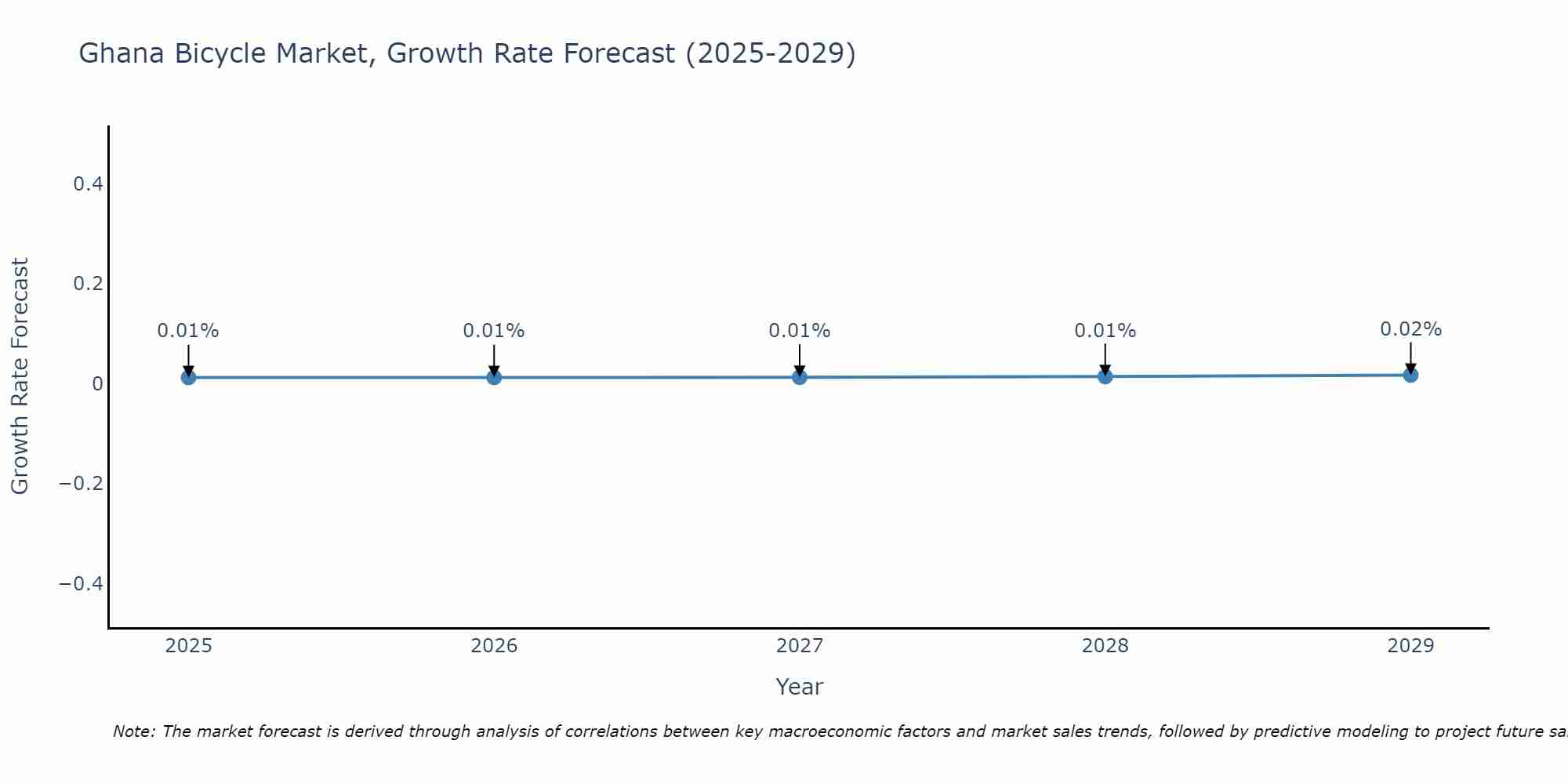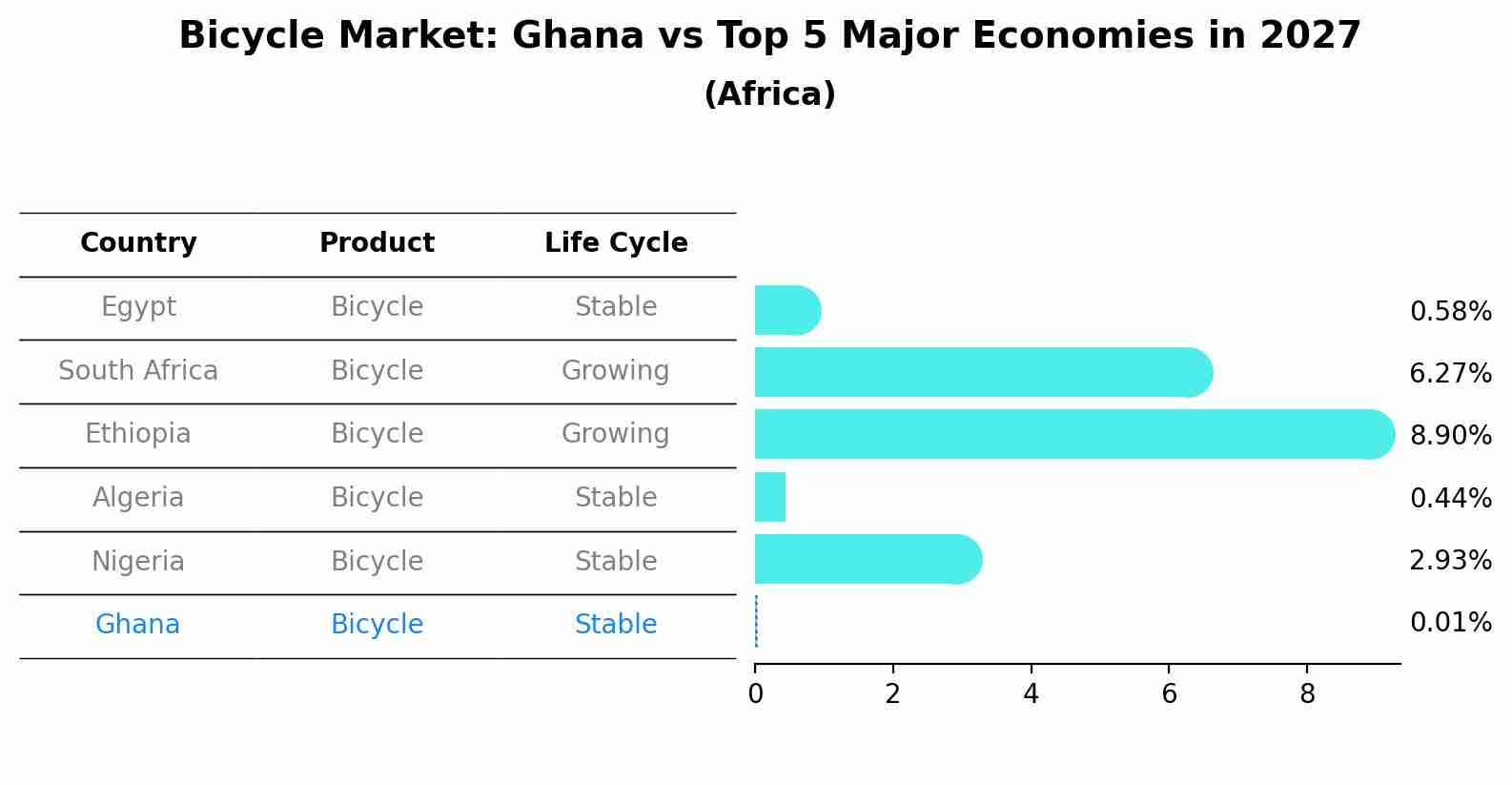Ghana Bicycle Market (2025-2031) Outlook | Analysis, Growth, Share, Companies, Trends, Value, Size, Forecast, Industry & Revenue
| Product Code: ETC362156 | Publication Date: Aug 2022 | Updated Date: Aug 2025 | Product Type: Market Research Report | |
| Publisher: 6Wresearch | Author: Sachin Kumar Rai | No. of Pages: 75 | No. of Figures: 35 | No. of Tables: 20 |
Ghana Bicycle Market Size Growth Rate
The Ghana Bicycle Market is poised for steady growth rate improvements from 2025 to 2029. From 0.01% in 2025, the growth rate steadily ascends to 0.02% in 2029.

Bicycle Market: Ghana vs Top 5 Major Economies in 2027 (Africa)
By 2027, Ghana's Bicycle market is forecasted to achieve a stable growth rate of 0.01%, with Egypt leading the Africa region, followed by South Africa, Ethiopia, Algeria and Nigeria.

Ghana Bicycle Market Synopsis
The Ghana bicycle market is a growing sector characterized by increasing demand for bicycles due to their affordability, eco-friendliness, and health benefits. The market is primarily driven by a rising awareness of the importance of physical fitness and environmental sustainability. With a focus on promoting cycling as a mode of transportation and recreation, the government has implemented policies to improve infrastructure and create a more cycling-friendly environment. Key players in the market include local and international bicycle manufacturers, as well as retailers catering to a diverse consumer base. Factors such as urbanization, population growth, and changing consumer preferences towards sustainable transportation options are expected to further drive the growth of the Ghana bicycle market in the coming years.
Ghana Bicycle Market Trends
The Ghana Bicycle Market is experiencing a growing trend towards eco-friendly transportation options and a focus on health and fitness, leading to an increase in the demand for bicycles. There is a noticeable shift towards the adoption of electric bikes for their convenience and sustainability benefits. Additionally, there is a rising interest in specialized bicycles such as mountain bikes and road bikes, catering to specific consumer preferences and activities. The market is also witnessing a surge in online sales and marketing of bicycles, enabling easier access for customers across the country. Overall, the Ghana Bicycle Market is evolving to meet the changing needs and preferences of consumers, with a focus on sustainability, health, and convenience driving market growth.
Ghana Bicycle Market Challenges
In the Ghana bicycle market, some challenges faced include limited infrastructure to support cycling, such as designated bike lanes and safe cycling routes, which hinders the overall growth of the market. Additionally, high import taxes and tariffs on bicycles and bicycle parts make it costly for consumers to purchase bikes, impacting affordability and accessibility. The lack of awareness and education on the benefits of cycling as a mode of transportation and exercise also presents a challenge in increasing demand for bicycles in Ghana. Furthermore, competition from other modes of transportation, such as motorcycles and cars, poses a threat to the bicycle market. Overcoming these challenges will require efforts to improve infrastructure, reduce import tariffs, increase awareness, and promote cycling as a sustainable and healthy transportation option in Ghana.
Ghana Bicycle Market Investment Opportunities
The Ghana bicycle market presents promising investment opportunities due to the increasing demand for bicycles as a cost-effective and eco-friendly mode of transportation. With the government`s emphasis on promoting sustainable transportation solutions and improving infrastructure for cycling, there is a growing market for both traditional and electric bicycles in Ghana. Investors can consider opportunities in manufacturing and assembling bicycles locally to cater to the rising demand, as well as retailing and distribution of a variety of bicycle types and accessories. Additionally, there is potential for offering bicycle rental services in major cities and tourist destinations. Collaborating with local cycling clubs and organizations can also provide avenues for marketing and promoting bicycles in Ghana. Overall, the Ghana bicycle market offers diverse investment prospects for those looking to capitalize on the growing trend towards cycling.
Jordan Agar Market Government Policies
The Ghanaian government has implemented various policies to promote the bicycle market in the country. One significant initiative is the National Transport Policy, which aims to encourage the use of bicycles as a sustainable mode of transportation to reduce traffic congestion and promote a healthier lifestyle. Additionally, the government has introduced import duty exemptions on bicycles and spare parts to make them more affordable for consumers. There are also ongoing efforts to improve cycling infrastructure, such as dedicated bike lanes and parking facilities, to enhance the safety and convenience of cycling in urban areas. Overall, these policies demonstrate the government`s commitment to supporting and growing the bicycle market in Ghana.
Ghana Bicycle Market Future Outlook
The future outlook for the Ghana Bicycle Market appears promising due to several factors. With increasing awareness of health and environmental benefits, coupled with growing concerns about traffic congestion and rising fuel prices, there is a growing interest in cycling as a mode of transportation. Additionally, government initiatives to promote cycling infrastructure and a shift towards sustainable urban development are expected to further drive the demand for bicycles in Ghana. The market is likely to witness a surge in sales of electric bicycles as well, catering to the need for eco-friendly and efficient transportation options. Overall, the Ghana Bicycle Market is anticipated to experience steady growth in the coming years, offering opportunities for both local and international manufacturers and retailers to capitalize on the evolving consumer preferences and market trends.
Key Highlights of the Report:
- Ghana Bicycle Market Outlook
- Market Size of Ghana Bicycle Market, 2024
- Forecast of Ghana Bicycle Market, 2031
- Historical Data and Forecast of Ghana Bicycle Revenues & Volume for the Period 2021 - 2031
- Ghana Bicycle Market Trend Evolution
- Ghana Bicycle Market Drivers and Challenges
- Ghana Bicycle Price Trends
- Ghana Bicycle Porter's Five Forces
- Ghana Bicycle Industry Life Cycle
- Historical Data and Forecast of Ghana Bicycle Market Revenues & Volume By Product for the Period 2021 - 2031
- Historical Data and Forecast of Ghana Bicycle Market Revenues & Volume By Mountain Bikes for the Period 2021 - 2031
- Historical Data and Forecast of Ghana Bicycle Market Revenues & Volume By Hybrid Bikes for the Period 2021 - 2031
- Historical Data and Forecast of Ghana Bicycle Market Revenues & Volume By Road Bikes for the Period 2021 - 2031
- Historical Data and Forecast of Ghana Bicycle Market Revenues & Volume By Cargo Bikes for the Period 2021 - 2031
- Historical Data and Forecast of Ghana Bicycle Market Revenues & Volume By Others for the Period 2021 - 2031
- Historical Data and Forecast of Ghana Bicycle Market Revenues & Volume By Technology for the Period 2021 - 2031
- Historical Data and Forecast of Ghana Bicycle Market Revenues & Volume By Electric for the Period 2021 - 2031
- Historical Data and Forecast of Ghana Bicycle Market Revenues & Volume By Conventional for the Period 2021 - 2031
- Historical Data and Forecast of Ghana Bicycle Market Revenues & Volume By End-user for the Period 2021 - 2031
- Historical Data and Forecast of Ghana Bicycle Market Revenues & Volume By Men for the Period 2021 - 2031
- Historical Data and Forecast of Ghana Bicycle Market Revenues & Volume By Women for the Period 2021 - 2031
- Historical Data and Forecast of Ghana Bicycle Market Revenues & Volume By Kids for the Period 2021 - 2031
- Historical Data and Forecast of Ghana Bicycle Market Revenues & Volume By Distribution Channel for the Period 2021 - 2031
- Historical Data and Forecast of Ghana Bicycle Market Revenues & Volume By Online for the Period 2021 - 2031
- Historical Data and Forecast of Ghana Bicycle Market Revenues & Volume By Offline for the Period 2021 - 2031
- Ghana Bicycle Import Export Trade Statistics
- Market Opportunity Assessment By Product
- Market Opportunity Assessment By Technology
- Market Opportunity Assessment By End-user
- Market Opportunity Assessment By Distribution Channel
- Ghana Bicycle Top Companies Market Share
- Ghana Bicycle Competitive Benchmarking By Technical and Operational Parameters
- Ghana Bicycle Company Profiles
- Ghana Bicycle Key Strategic Recommendations
Frequently Asked Questions About the Market Study (FAQs):
- Single User License$ 1,995
- Department License$ 2,400
- Site License$ 3,120
- Global License$ 3,795
Search
Thought Leadership and Analyst Meet
Our Clients
Related Reports
- Germany Breakfast Food Market (2026-2032) | Industry, Share, Growth, Size, Companies, Value, Analysis, Revenue, Trends, Forecast & Outlook
- Australia Briquette Market (2025-2031) | Growth, Size, Revenue, Forecast, Analysis, Trends, Value, Share, Industry & Companies
- Vietnam System Integrator Market (2025-2031) | Size, Companies, Analysis, Industry, Value, Forecast, Growth, Trends, Revenue & Share
- ASEAN and Thailand Brain Health Supplements Market (2025-2031) | Strategy, Consumer Insights, Analysis, Investment Trends, Opportunities, Growth, Size, Share, Industry, Revenue, Segments, Value, Segmentation, Supply, Forecast, Restraints, Outlook, Competition, Drivers, Trends, Demand, Pricing Analysis, Competitive, Strategic Insights, Companies, Challenges
- ASEAN Bearings Market (2025-2031) | Strategy, Consumer Insights, Analysis, Investment Trends, Opportunities, Growth, Size, Share, Industry, Revenue, Segments, Value, Segmentation, Supply, Forecast, Restraints, Outlook, Competition, Drivers, Trends, Demand, Pricing Analysis, Competitive, Strategic Insights, Companies, Challenges
- Europe Flooring Market (2025-2031) | Outlook, Share, Industry, Trends, Forecast, Companies, Revenue, Size, Analysis, Growth & Value
- Saudi Arabia Manlift Market (2025-2031) | Outlook, Size, Growth, Trends, Companies, Industry, Revenue, Value, Share, Forecast & Analysis
- Uganda Excavator, Crane, and Wheel Loaders Market (2025-2031) | Strategy, Consumer Insights, Analysis, Investment Trends, Opportunities, Growth, Size, Share, Industry, Revenue, Segments, Value, Segmentation, Supply, Forecast, Restraints, Outlook, Competition, Drivers, Trends, Demand, Pricing Analysis, Competitive, Strategic Insights, Companies, Challenges
- Rwanda Excavator, Crane, and Wheel Loaders Market (2025-2031) | Strategy, Consumer Insights, Analysis, Investment Trends, Opportunities, Growth, Size, Share, Industry, Revenue, Segments, Value, Segmentation, Supply, Forecast, Restraints, Outlook, Competition, Drivers, Trends, Demand, Pricing Analysis, Competitive, Strategic Insights, Companies, Challenges
- Kenya Excavator, Crane, and Wheel Loaders Market (2025-2031) | Strategy, Consumer Insights, Analysis, Investment Trends, Opportunities, Growth, Size, Share, Industry, Revenue, Segments, Value, Segmentation, Supply, Forecast, Restraints, Outlook, Competition, Drivers, Trends, Demand, Pricing Analysis, Competitive, Strategic Insights, Companies, Challenges
Industry Events and Analyst Meet
Whitepaper
- Middle East & Africa Commercial Security Market Click here to view more.
- Middle East & Africa Fire Safety Systems & Equipment Market Click here to view more.
- GCC Drone Market Click here to view more.
- Middle East Lighting Fixture Market Click here to view more.
- GCC Physical & Perimeter Security Market Click here to view more.
6WResearch In News
- Doha a strategic location for EV manufacturing hub: IPA Qatar
- Demand for luxury TVs surging in the GCC, says Samsung
- Empowering Growth: The Thriving Journey of Bangladesh’s Cable Industry
- Demand for luxury TVs surging in the GCC, says Samsung
- Video call with a traditional healer? Once unthinkable, it’s now common in South Africa
- Intelligent Buildings To Smooth GCC’s Path To Net Zero


















